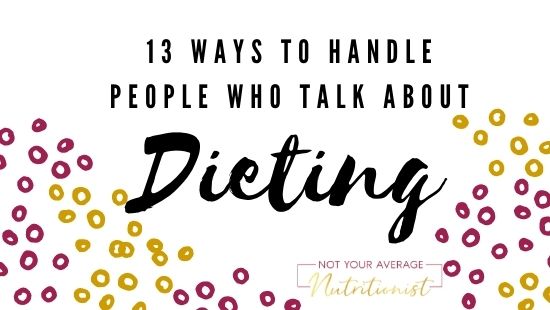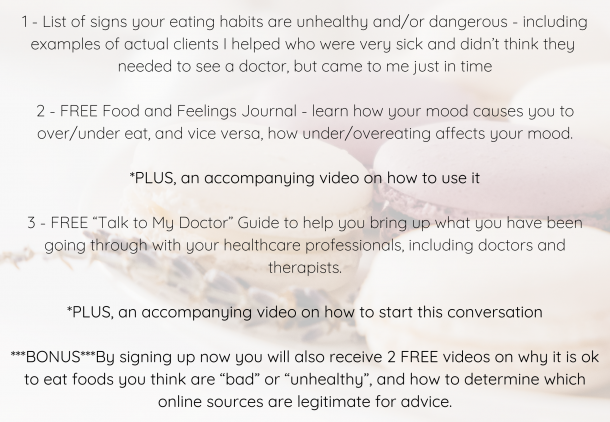By Emily Cafarella. Emily is currently an undergraduate student at the University of Alabama studying Food and Nutrition with a DPD! She is in pursuit of becoming a Registered Dietitian and is passionate about fueling your body with nutrients and movement to create a sustainable and balanced lifestyle! Emily hopes to open up a private practice in the future to further promote and spread awareness about health and wellness
Diet and weight culture is ubiquitous.
It can be exhausting to have friends, family, coworkers, and peers who constantly talk about the new diet they are on or how much they want to lose weight. Maybe they’re trying to tell you their method of weight loss/gain, the new exercise program they’re on, or the new diet they’re trying out. Wherever we look (social media and in person), it seems like so many people are in the middle of this trend of needing to lose weight or be on a diet.
For a lot of people, talking about diets and weight is not as harmless as it seems, and can actually cause a lot of anxiety, decrease self-esteem, and worsen body image. It can feel insulting if you are overweight and all someone talks about is how they want to lose weight, or if you are underweight and all they discuss is wanting to gain weight. Regardless of what sense they are discussing diet or weight, it can be uncomfortable when used as small talk. Even more harmfully, it can trigger some people to develop an eating disorder. Unfortunately, one in every four people who choose to diet end up developing an eating disorder as a result of the diet. This constant talk about diets starts to normalize and initiate eating disorders and must be put to an end. Is this how you feel? If so, you’re not alone.
There are many ways you can change the tone when someone starts talking about diets or weight in a conversation around you. Below is a list of some ideas on how to handle an uncomfortable conversation:
Try the following:
- Walk away- If the conversation is with someone you are not close or comfortable with- it is no longer serving you and you do not owe them an explanation. A simple “I have to go, sorry!” can work just fine. Your boundaries are your boundaries!
- Change the subject- Turn it into a more lighthearted conversation, use a word they mentioned and just piggyback it into a different topic.
- Saying “Can we talk about something else?” works great!
- You could also explain a bit, saying something like “I’ve worked really hard at accepting my body, and this feels like a setback. Let’s talk about something more positive.”
- If you are comfortable with sharing personal information with them, try saying “I have had problems with disordered eating in the past, and I don’t want to talk about this anymore.”
- Or something like: “This conversation is a trigger for my eating disorder. Let’s talk about something else.”
- Or if they’re talking about unhealthy foods “Hey, there’s no problem with eating things that taste good!”
- If someone mentions working out to ‘make up for the cheat meals’, try something like “That’s not how bodies work, there’s no need to have to make up for what we eat!”
- You also don’t need to have a bunch of responses ready at all times. If you do not feel up to responding to anyone, just simply nod along until they get the message that you no longer want to discuss it.
- If they just can’t stop talking so negatively about themselves, try asking some of these questions “What has been helping you feel good about the body you’re currently in?” or something like “But food is such a blessing! What is your favorite thing to eat?”
- You could be blunt as well, just saying “It doesn’t make me feel good when our conversations are about diets and weight loss.”
- You could even throw some facts at them if they like to hear logical explanations, something like “Did you know that research shows that most people who lose weight from dieting gain it back? Why don’t you try some sustainable life adjustments?”
- Give them some healthy food tip insight “Intuitive eating can really help people develop a healthier relationship with food, do you want to hear more about it?”
Being around people who talk about diets and weight is inevitable. You cannot control what they choose to talk about and what they do in their free time, but you can control what direction the conversation takes. If you are uncomfortable with the tone of the conversation, try some of those prompts- and if all else fails, exit the conversation! It’s not worth your mental health!

How we at NYAN can help, from least-to-most hands on care:
- Book: Permission To Eat: A practical guide to working yourself out of an eating disorder during college, while celebrating the awesomeness that is you!
- Group coaching: Permission To Eat With Confidence
- 1:1 Medical Nutrition Counseling with our ED RDs


